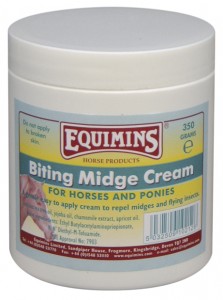Not so sweet
Sweet itch is a horrible condition that is the result of an allergic reaction, so it’s not something that every horse and pony will get or could suffer from. For those who do have the condition, spring, summer and even autumn can be a long way away from the pleasant seasons that some of us long for in the middle of winter.
Any breed of horse or pony can suffer from sweet itch if they have an allergy to the saliva of the Culicoides midge…is doesn’t matter whether they are a Shetland or a four star event horse. When the horse gets bitten by a midge, it starts a chain reaction that makes the horse’s skin itchy around the area of the bite. This causes the horse to scratch the area, and that’s what leads to manes and tails being rubbed out, sore areas and bleeding. With open wounds, there’s the potential for infection, so this could be an additional issue for the sweet itch horse.
The bad news is that there’s no ‘cure’ as such, but there are ways to help manage the condition, to help prevent the midge biting the horse in the first place, thus breaking the cycle. One key place to start with is the area that your horse grazes. Midges tend to be found in greater numbers around water, wet areas and muck heaps, so try and keep your horse away from these areas if at all possible. Equally, midges find it difficult to fly in windy conditions, so exposed fields can be better at this time of year. The midge is most active at dawn and dusk, so keeping the horse stabled during these key times can also really help. Over and above this, sweet itch rugs provide a barrier between horse and midge, and can help prevent bites. Equally, repellent products can help to keep midges away. Adding a supplement to the feed to help repel and/or to help nutritionally support the skin can also be of benefit.
The best way to help prevent your horse suffering is to act before he exhibits symptoms as if the reaction has already started, management may need to be changed to incorporate wound care too.
If you’re concerned about your horse then it’s always best to contact your vet.
 If you’re looking for products to help your horse or pony during biting midge season, we have two great ones: Biting Midge Cream and Itchless. These products can be used on their own, but are even better when used together. Biting Midge Cream helps to soothe itchy skin at the same time as repelling biting midges while Itchless, a liquid herbal tincture, helps to provide nutritional support to the horse’s skin and can also be diluted and used as a body wash. We also sell garlic in liquid, powder, granule and flake form that can be used to help repel flies from the inside out. See our full Fly & Midge range here.
If you’re looking for products to help your horse or pony during biting midge season, we have two great ones: Biting Midge Cream and Itchless. These products can be used on their own, but are even better when used together. Biting Midge Cream helps to soothe itchy skin at the same time as repelling biting midges while Itchless, a liquid herbal tincture, helps to provide nutritional support to the horse’s skin and can also be diluted and used as a body wash. We also sell garlic in liquid, powder, granule and flake form that can be used to help repel flies from the inside out. See our full Fly & Midge range here.

 Equimins specialises in producing natural horse supplies, products and supplements for the major areas associated with caring for a horse. All products are proudly made in the UK and excellent specification quality products are of paramount importance. Using this blog we want to share some of the knowledge we have gained through nearly 30 years of experience.
Equimins specialises in producing natural horse supplies, products and supplements for the major areas associated with caring for a horse. All products are proudly made in the UK and excellent specification quality products are of paramount importance. Using this blog we want to share some of the knowledge we have gained through nearly 30 years of experience. 


